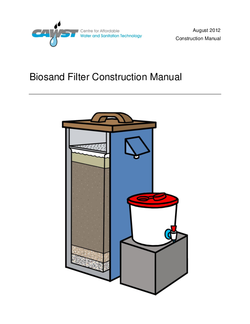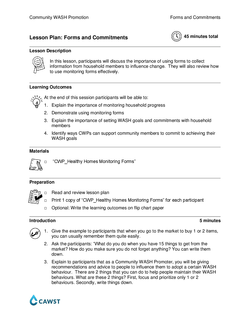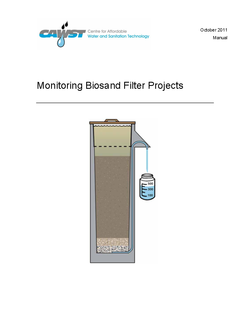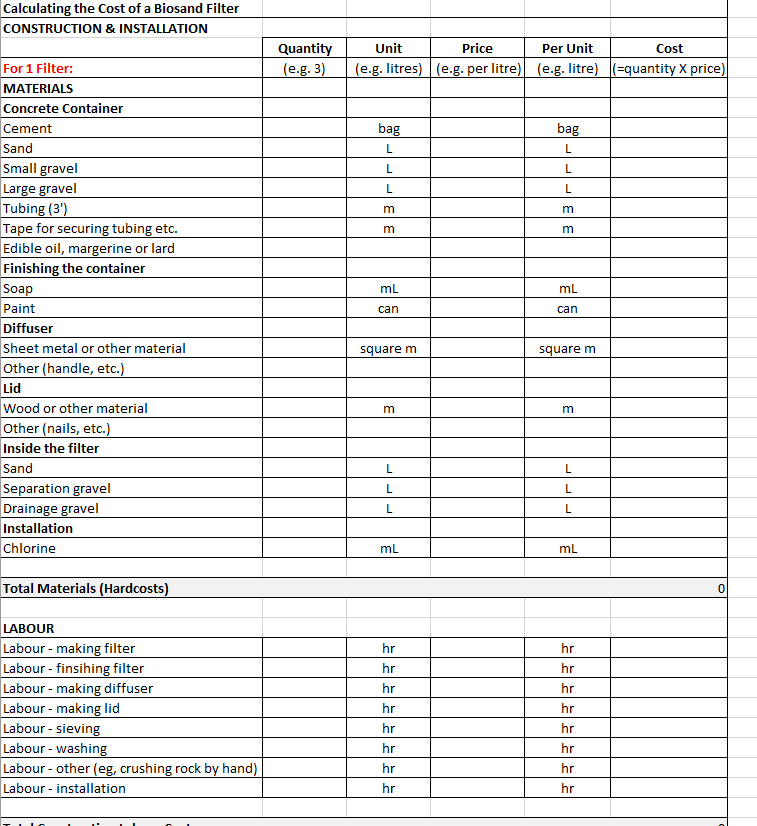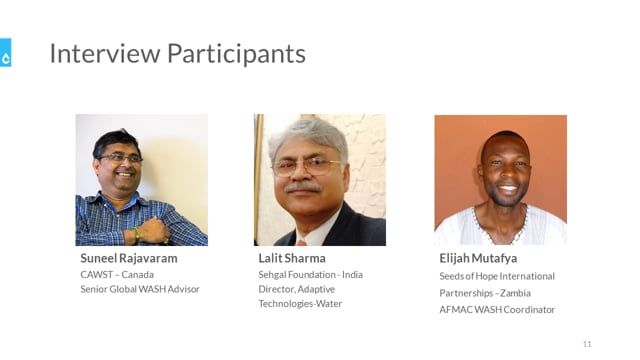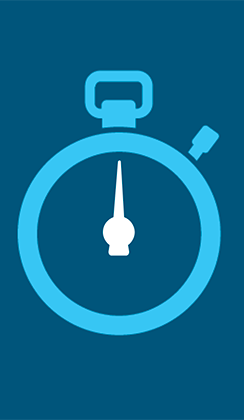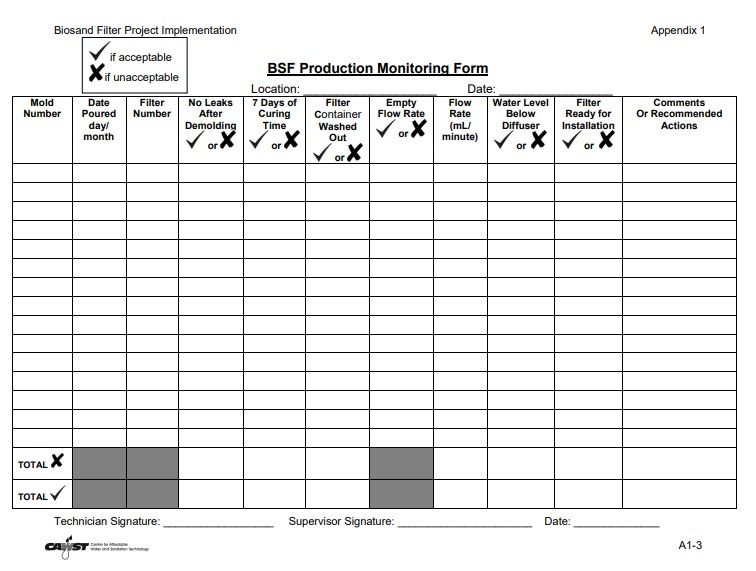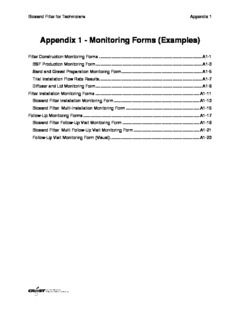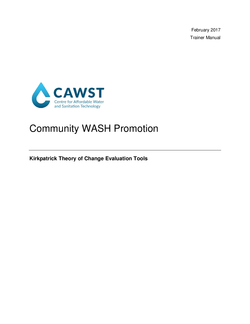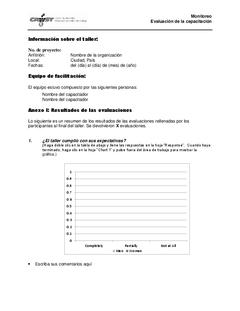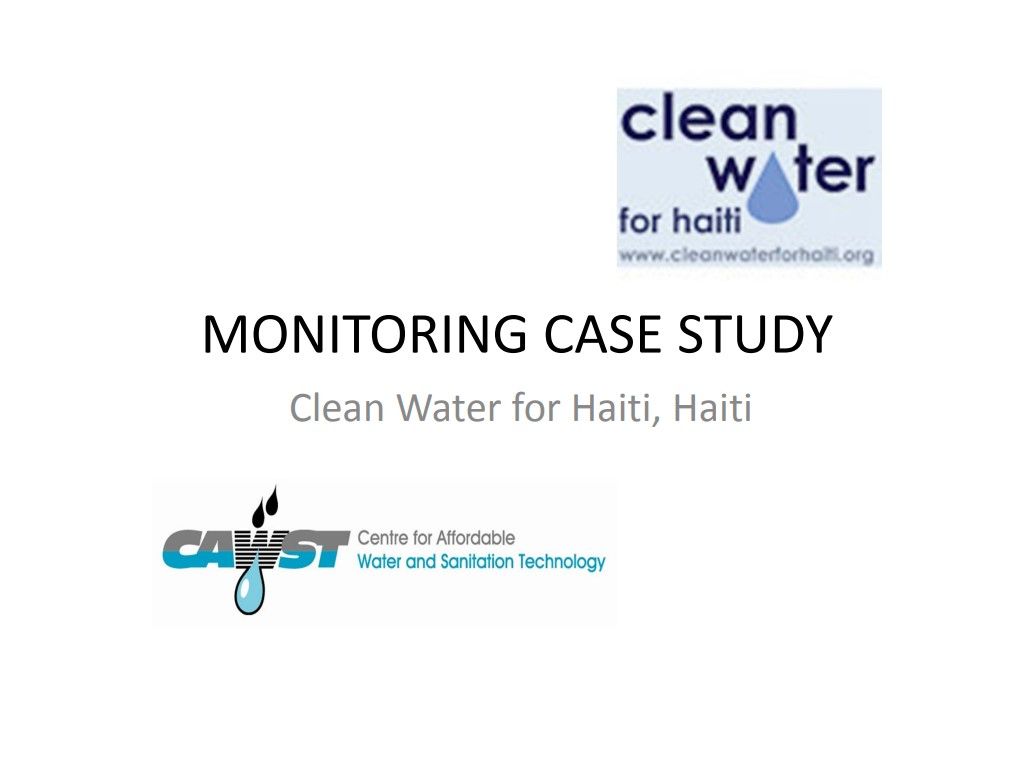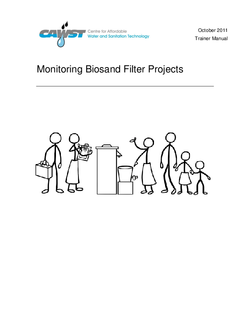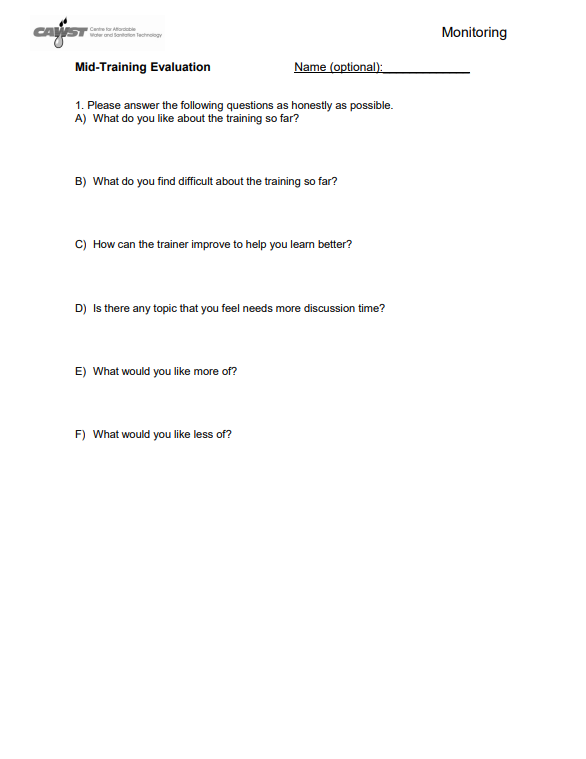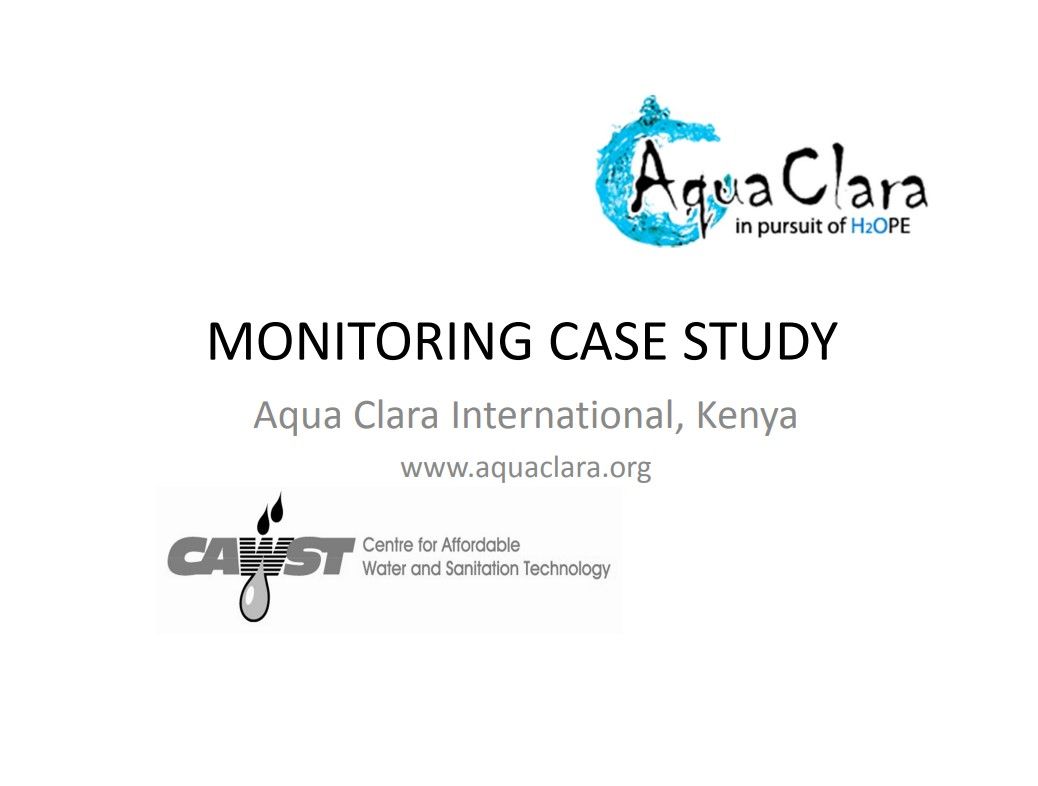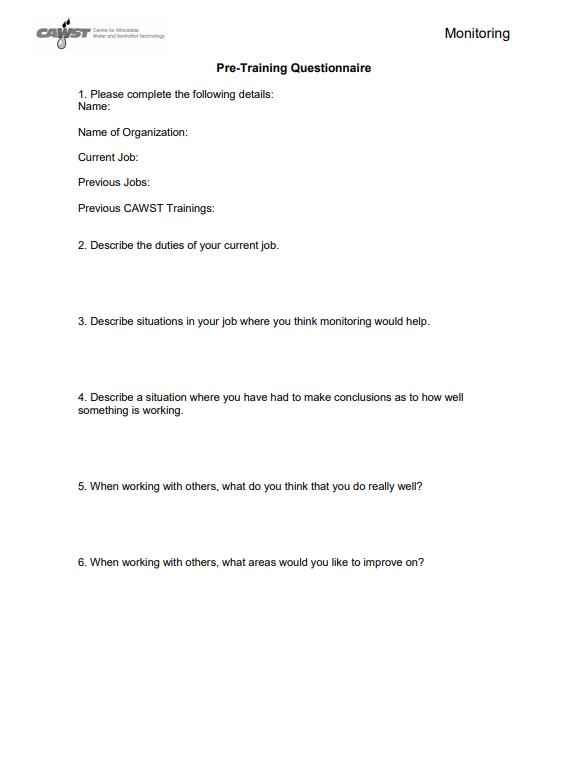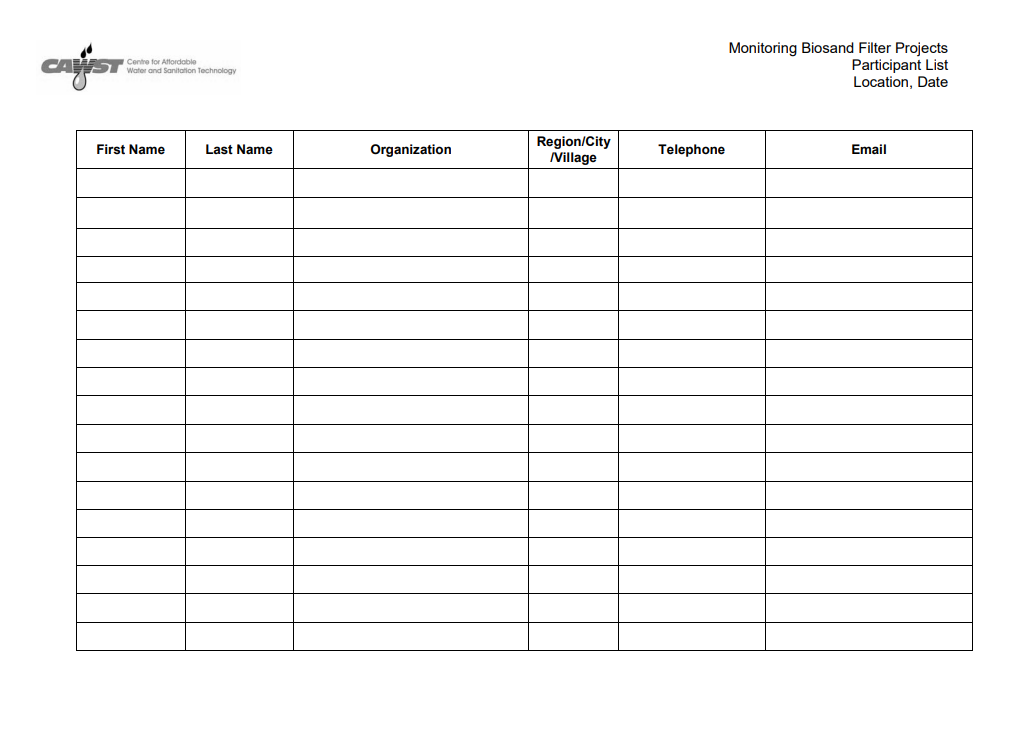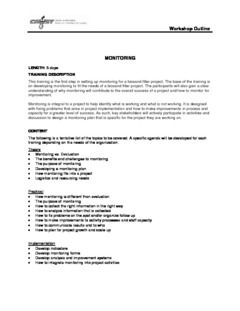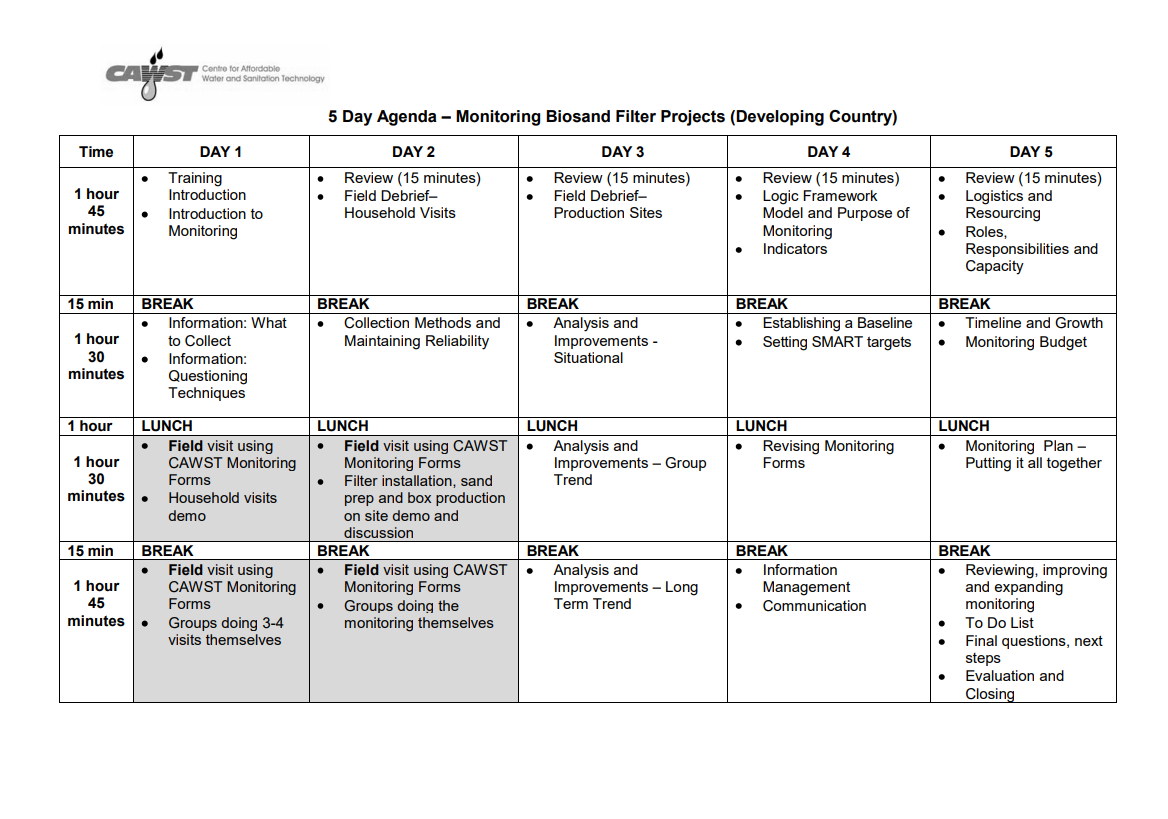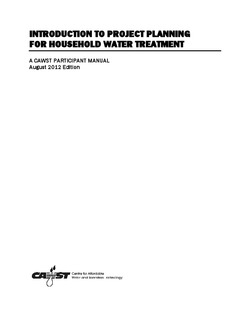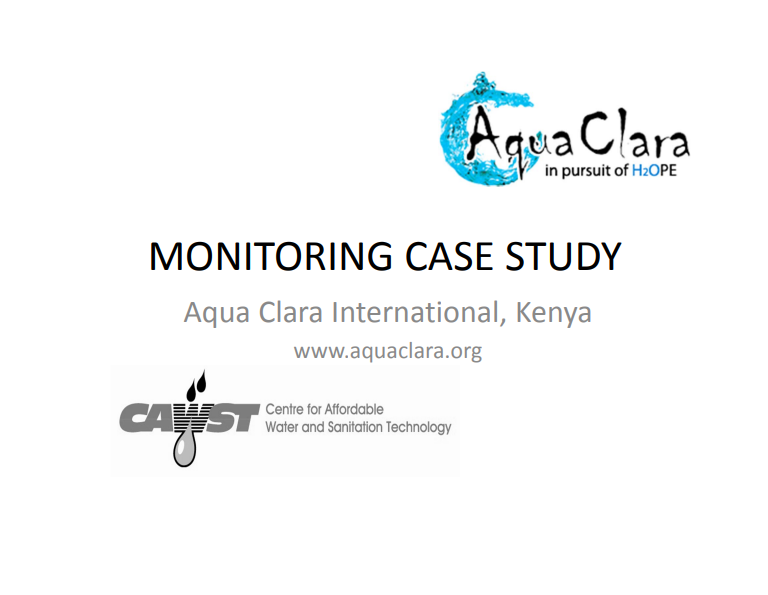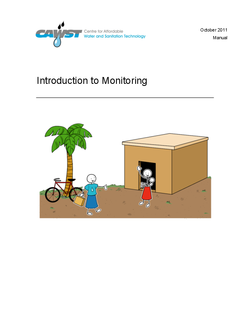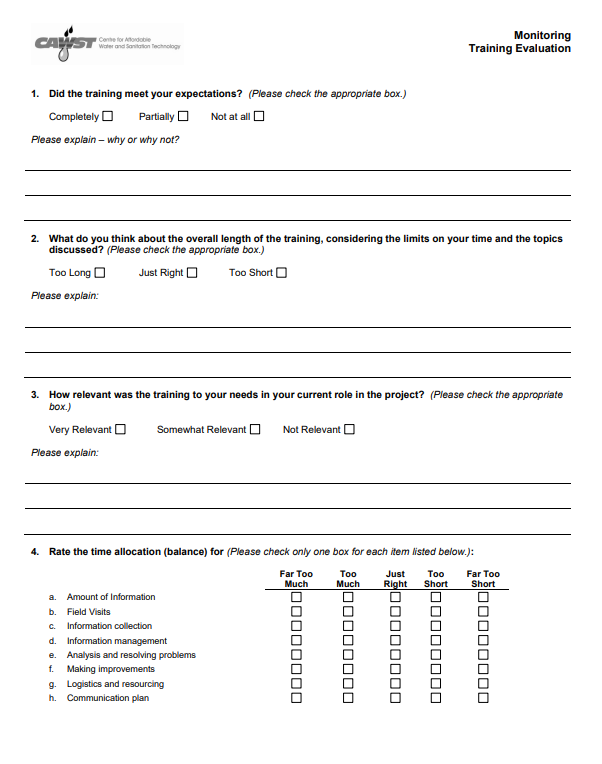Explore Monitoring and Evaluation
Household Water Treatment Technologies: Sanitary Inspection Forms
Use these sanitary inspection forms to evaluate actual and potential sources of contamination for different household water treatment technologies.
Languages
English
Thai
Spanish
French
Khmer
Sanitary Inspection Form: Boiling and Pasteurisation
This sanitary inspection form is used to evaluate potential sources of contamination and helps identify risks in boiling practices, equipment, storage, and everyday usage.
Languages
English
Sanitary Inspection Form: Household Slow Sand Filters
This sanitary inspection form is used to evaluate actual and potential sources of contamination for a household slow sand filter.
Languages
English
Thai
Biosand Filter Construction Manual
This illustrated manual describes what a biosand filter is and how it works. It also describes the steps to construct, install and monitor Version 10 biosand filters
Languages
Spanish
English
French
Khmer
Stainless Steel Biosand Filter (JalKalp) Guide
This guide is designed to support the Community Health Promoter in encouraging the adoption, monitoring and performance evaluation of the JalKalp Biosand Filter.
Languages
Hindi
Forms and Commitments - Lesson Plan (CWP)
In this lesson, participants will discuss the importance of using forms to collect information from household members to influence change. They will also review how to use monitoring forms effectively.
Languages
English
Arabic
French
Spanish
Monitoring Biosand Filter Projects Manual
This manual is for project implementers who want to improve and strengthen their biosand filter projects.
Languages
English
Community WASH Promotion (CWP) Workshop
These workshop materials contain the resources for the Community WASH Promotion workshop. The role of the Community WASH Promoter is essential for the successful implementation of any household water treatment, sanitation, or hygiene (WASH) project. Through this workshop, participants will gain a clear understanding of the best practices for supporting community members in changing their behaviours of WASH practices with the aim of achieving improved community livelihoods.
Languages
English
Spanish
French
Arabic
Hindi
nt
Biosand Filter Project Budget Spreadsheet
This spreadsheet contains budget tables that can be used to cost out or budget for a biosand filter project. It can also be used to track on-going project costs.
Languages
English
Mobiles, Tablets, and ICTs for WASH Projects - Webinar
A video recording of the webinar on May 19, 2016 - Mobiles, Tablets, and ICTs for WASH Projects. Many WASH programs around the world are using cell phones and tablets to better monitor their work, and to communicate with field staff and beneficiaries. This presentation and Q&A is an introduction to mobile and digital tools that can support your WASH projects.
Languages
English
Household Water Treatment and Safe Storage Case Studies
Discover how other people run their HWTS projects, what works and what they would change if they could by checking out the following case studies and resources.
Languages
English
French
Spanish
Drinking Water Quality Testing in BSF Implementation
This video interview explores why to use Drinking Water Quality Testing (DWQT) when implementing a Biosand Filter (BSF) project. The interview with experienced BSF implementers includes Lalit Sharma of Sehgal Foundation (India), Elijah Mutafya of Seeds of Hope International Partnership (Zambia) and Suneel Rajavaram of CAWST (Canada) sharing their experiences using DWQT in support of their BSF projects.
Languages
English
Behaviour Change Two Minute Tools for Rapid Assessment
These videos will introduce you to a few rapid assessment tools that you can use when seeking to create a context-specific behaviour change intervention.
Languages
English
Spanish
French
Arabic
Learn About Behaviour Change
In this collection you will find online learning activities and job aids that will help you to incorporate behaviour change into WASH program design.
Languages
English
Spanish
French
Arabic
Appendix 1 - Monitoring Forms (BSF Project Implementation)
This appendix from the Biosand Filter Project Implementation Construction Manual includes monitoring forms.
Languages
French
Spanish
English
Biosand Filter Project Implementation Workshop
This collection contains the resources for both trainers and participants for the Biosand Filter Project Implementation workshop. This workshop is designed for biosand filter project managers and technicians. This workshop includes information and hands-on experience on the construction, use and monitoring of the biosand filter. The hands-on topics include checking the steel mold, making the concrete filter container, preparing filtration sand, installing filters and conducting follow-up visits. The participant will gain a clear understanding of the rationale behind the filter design and why proper preparation of the filtration sand is so important.
Languages
French
English
Spanish
nt
Khmer
Household Storage Container Sanitary Inspection Form
This sanitary inspection form is used to evaluate actual and potential sources of contamination for a household storage container.
Languages
French
English
Spanish
Appendix 1 - Monitoring Forms (BSF for Tech)
This appendix from the Biosand Filter for Technicians Construction Manual includes monitoring forms.
Languages
French
Spanish
English
Monitoring Biosand Filter Projects Workshop
This collection contains the resources for both trainers and participants for the Monitoring for Biosand Filter Projects. This five day workshop is primarily designed for biosand filter technicians, community health promoters and project managers. The workshop provides background on how and why this service was developed, tips to help you plan for a successful consultation, and several tools to help deliver your training, such as monitoring forms, checklists, lesson plans and case studies.
Languages
Spanish
French
English
Community WASH Promotion Evaluation Tools (CWP)
CAWST uses the Kirkpatrick framework in workshop design. Based on this, we created a Theory of Change for the Community WASH Promotion workshop as well as tools to evaluate the workshop’s effectiveness. This document presents tools to evaluate the effectiveness of your training workshop. It includes questionnaires and observation sheets.
Languages
English
Spanish
French
Monitoring Biosand Filter Projects Final Evaluation Summary
This is a template of how to display the results of your final evaluations
Languages
Spanish
English
French
Clean Water for Haiti Case Study Presentation (Monitoring BSF Projects)
This is a case study of a biosand monitoring project in Haiti
Languages
English
Monitoring Biosand Filter Projects Trainer Manual
This manual is for trainers who are interested in delivering training on how to monitor BSF projects in order to improve their quality. It includes lessons plans and guidance on training delivery.
Languages
English
Monitoring Biosand Filter Projects Training Evaluation Day 1
This questionnaire gives the trainer feedback mid way through the training in order to help the trainer better prepare and create relevant sessions
Languages
French
English
Spanish
Biosand Filter Monitoring by Aqua Clara International in Kenya
This case study describes Aqua Clara International's monitoring program for biosand filters in Kenya.
Languages
French
Spanish
English
Monitoring Biosand Filter Projects Pre Training Questionnaire
This questionnaire helps the trainer to understand their audience and their level of knowledge pre-workshop
Languages
English
French
Spanish
Monitoring Biosand Filter Projects Participant List Template
This participant List template is a tool that will help you keep a database of participant information
Languages
Spanish
French
English
Monitoring Biosand Filter Projects Workshop Outline
This workshop outline contains a workshop description, objectives, audience, content and training materials needed for this workshop
Languages
French
English
Spanish
Monitoring Biosand Filter Projects 5 Day Agenda
This agenda lays out how to run a 5 day workshop on BSF project monitoring that includes theory and field practice
Languages
Spanish
French
English
Project Planning for Household Water Treatment Manual
This document can be used as a workbook to plan household water treatment projects.
Languages
English
Spanish
Aqua Clara in Kenya Case Study Presentation (Monitoring BSF Projects)
This is a case study of a biosand monitoring project in Kenya
Languages
English
Introduction to Monitoring Manual
This manual is for project implementers who want to improve and strengthen the monitoring of their water, sanitation and hygiene projects.
Languages
English
Data to Drops: Leveraging Water Point Data for Improved Decisions
This session will look at how governments, civil society organizations, donors, and other stakeholders can maximize the impact of water point mapping. From planning water point mapping activities, to sharing the data, to analyzing the information and taking action, this session will look at best practices, opportunities, and future trends. Participants will get to learn about the state of the art in increasing the value of water point data through a presentation by the Water Point Data Exchange, and then have an opportunity to participate in a virtual discussion on next steps.
Languages
English
Monitoring Biosand Filter Projects Final Evaluation
This questionnaire is to be handed out at the end of the workshop to give the trainer constructive feedback on the workshop
Languages
Spanish
English
French
About CAWST
CAWST is a Canadian charity and licensed engineering firm. We address the global need for safe drinking water and sanitation by building local knowledge and skills on household solutions people can implement themselves.


